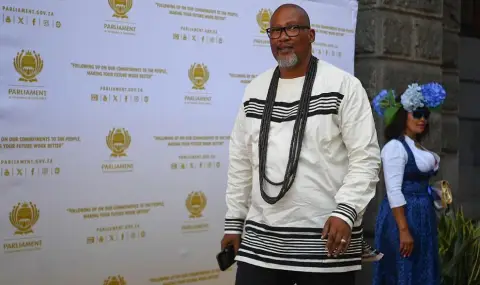The grandson of South Africa's first black president, Nelson Mandela, said the British government denied him an entry visa because of his support for "Hamas" and his position in relation to the war between Israel and the Palestinian Islamist movement, the Associated Press reported, quoted by dariknews.bg.
Mandla Mandela did not travel to the UK earlier this month to speak at pro-Palestinian rallies in Manchester, Edinburgh and Glasgow after being told he would need a visa, despite holding a South African government passport, which in principle allows visa-free entry to the UK.
This week, however, the UK Home Office sent Mandela a letter informing him that his visa application had been rejected because of "his support for "Hamas" and because his presence in the UK "does not contribute to the public good".
Mandela told the AP that he received the letter dated October 21 only yesterday.
"Your presence in the UK has been judged to be unsuitable for the public good on the grounds that you have engaged in unacceptable behaviour. You have made a number of statements that explicitly support "Hamas" and their terrorist violence, including praising the attack on Israel on October 7 (last month) and their (killed) recently leader Ismail Haniya," said the letter seen by the AP.
The text refers to several posts by Mandela on "Instagram" (Instagram) in which he expresses his support for "Hamas" and the Palestinians, including one with Haniya, who was killed at the end of July.
The letter also highlighted that Mandela attended Haniya's funeral in August after meeting him twice in January and April this year, and posted a photo of himself with the senior "Hamas" leader. Khaled Meshaal.
"Your presence in the UK is therefore considered to be a threat to British society as it is highly likely to cause tension within the Jewish communities in Britain. It is in the interest of the community to deny you a visa in order to protect public security and prevent disorder or crime within the country," the letter concluded.
Britain's Home Office has not yet responded to AP's request for comment.
Mandela said the visa denial would not stop him from continuing to express his support for the Palestinians.
"We will never be silenced and we will never allow a visa denial to stop us from standing up for justice, peace and equality. We will continue to raise our voice against the unjust occupation, genocide and ethnic cleansing of Gaza and all of occupied Palestine sponsored by the United Kingdom and the like," he said.
Nelson Mandela's grandson also said the visa denial was an attempt to restrict his movement and freedom of expression, comparing it to the challenges faced by his grandfather, who spent 27 years in prison for his role in the fight against apartheid.
The racist system imposed by the white minority government was abolished in 1994, and Nelson Mandela became the first democratically elected leader of the Republic of South Africa, AP notes.
Pro-Palestinian organizations, including the Desmond Tutu Foundation in South Africa and the UK-based "Sheffield-Palestine Coalition Against Israeli Apartheid" criticized the British government's decision.
Mandla Mandela did not travel to the UK earlier this month to speak at pro-Palestinian rallies in Manchester, Edinburgh and Glasgow after being told he would need a visa, despite holding a South African government passport, which in principle allows visa-free entry to the UK.
This week, however, the UK Home Office sent Mandela a letter informing him that his visa application had been rejected because of "his support for "Hamas" and because his presence in the UK "does not contribute to the public good".
Mandela told the AP that he received the letter dated October 21 only yesterday.
"Your presence in the UK has been judged to be unsuitable for the public good on the grounds that you have engaged in unacceptable behaviour. You have made a number of statements that explicitly support "Hamas" and their terrorist violence, including praising the attack on Israel on October 7 (last month) and their (killed) recently leader Ismail Haniya," said the letter seen by the AP.
The text refers to several posts by Mandela on "Instagram" (Instagram) in which he expresses his support for "Hamas" and the Palestinians, including one with Haniya, who was killed at the end of July.
The letter also highlighted that Mandela attended Haniya's funeral in August after meeting him twice in January and April this year, and posted a photo of himself with the senior "Hamas" leader. Khaled Meshaal.
"Your presence in the UK is therefore considered to be a threat to British society as it is highly likely to cause tension within the Jewish communities in Britain. It is in the interest of the community to deny you a visa in order to protect public security and prevent disorder or crime within the country," the letter concluded.
Britain's Home Office has not yet responded to AP's request for comment.
Mandela said the visa denial would not stop him from continuing to express his support for the Palestinians.
"We will never be silenced and we will never allow a visa denial to stop us from standing up for justice, peace and equality. We will continue to raise our voice against the unjust occupation, genocide and ethnic cleansing of Gaza and all of occupied Palestine sponsored by the United Kingdom and the like," he said.
Nelson Mandela's grandson also said the visa denial was an attempt to restrict his movement and freedom of expression, comparing it to the challenges faced by his grandfather, who spent 27 years in prison for his role in the fight against apartheid.
The racist system imposed by the white minority government was abolished in 1994, and Nelson Mandela became the first democratically elected leader of the Republic of South Africa, AP notes.
Pro-Palestinian organizations, including the Desmond Tutu Foundation in South Africa and the UK-based "Sheffield-Palestine Coalition Against Israeli Apartheid" criticized the British government's decision.
